|
The majority of boxing movies (at least the one's I've seen – full disclosure here) seem to revolve around unlikely contenders who eventually win out against impossible odds, wish-fulfilment fantasies that focus on the exception rather than anything approaching the less-than-glamorous norm. And we root for them because the physicality of their fights and the determination of their training is representative of our own everyday struggles and emotional battles. Their journey may be tough, but they'll triumph in the end, just like we always hope we one day will. Having said that, this formula has been undermined in recent years by the likes of Clint Eastwood's emotionally punishing Million Dollar Baby and Tsukamoto Shinya's Tokyo Fist, in which boxing is transformed (or should that be mutated?) into a metaphor for emotional and physical self-destruction. It's a rare thing indeed that such a film – an American film no less – would elect to focus not on the winners or the bright young hopefuls of tomorrow, but those who never achieve greatness and whose hopes and dreams are never realised. This may not sound like a recipe for gripping cinema, but back in 1972 this very subject was the basis for what is widely regarded as one of the very greatest boxing-themed films of all.
The tone of the intriguingly titled Fat City – which was adapted by Leonard Gardner from his highly regarded first (and only) novel – is set during the opening title montage, in which the societally downtrodden residents of Stockton, California go about their daily routine to the melancholic strains of Kris Kristofferson singing Help Me Make It Through the Night. This observational feel is carried through into the scene that follows, as past-his-prime ex-boxer Billy Tully slowly gets up from his bed, lights a cigarette, dresses and heads out for the day. It may not sound like much, but everything about how this sequence plays out is revealingly expressive: the run-down, drab and colourless décor of Billy's glum apartment; Billy's haggard expression, his bedraggled underwear and the hangover slowness with which he moves; the naturalistic lighting of Conrad Hall's cinematography, which acknowledges that the only true light source is the window behind Billy and makes little attempt to fill in the shadows. If Tully were not played by Stacy Keach (who back in 1972 was not exactly a household name), you'd think you were watching documentary footage. Realism is the primary driving factor here, hardly the first characteristic the springs to mind when discussing the cinema of John Huston, the director of such distinctive dramatic works as The Maltese Falcon, Key Largo, The African Queen, Beat the Devil and Moby Dick. Indeed, had I not known in advance that this was the work of the then 66-year-old Huston, I'd have sworn this was a career-launching calling card of a new young filmmaker of serious note.
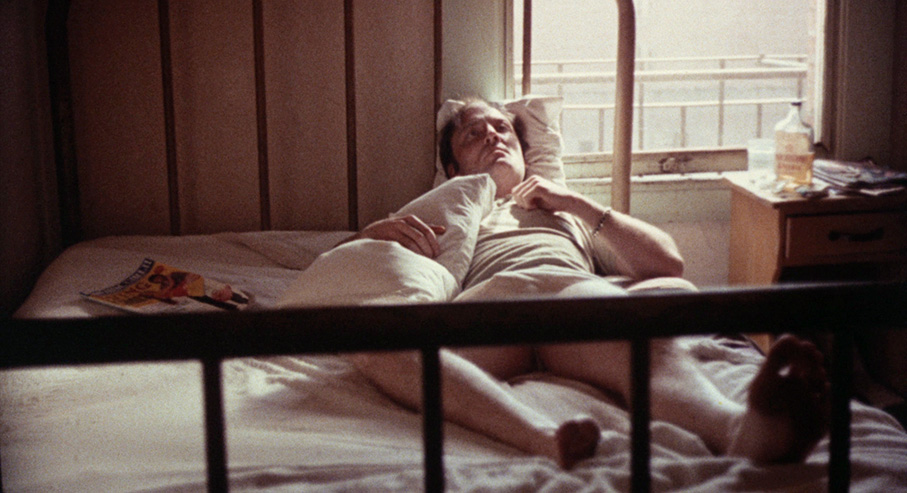
It's easy to miss that the encounter that kick-starts the narrative occurs by chance, as Billy steps out into the street, takes stock of the day, then on an afterthought nips back inside, grabs his kit bag and heads up to a near-deserted local gym to do a bit of training. The only other person there is 18-year-old Ernie Munger (Jeff Bridges), whom Billy persuades to do a little sparring and whose natural talent he is impressed enough with to recommend that he pay a visit to trainer Ruben (Nicholas Colasanto) with the ultimate aim of turning semi-pro. Ernie decides to take Billy's advice and drops in on Ruben, who likes what he sees, agrees to take him on and starts to train him for his first fight. Billy, meanwhile, whose life has been an alcoholic shambles since his wife walked out on him, starts hanging out with barfly Oma (Susan Tyrrell) and eventually moves in with her when her boyfriend Earl (Curtis Cokes) lands a spell in prison.
Fat City does not tell a story in the traditional sense, but instead provides a window into the lives of those whose dreams and ambitions are repeatedly undermined by the unforgiving backhand swipe of life. These are the forgotten also-rans in a world that celebrates fame and success and has little time or sympathy for those who end up falling by the wayside. In the early stages, Billy and Ernie seem to be heading in opposite directions, as Ernie takes his first hopeful steps in a world that has long since cast Billy aside, and with the very same trainer whom Billy still blames for the collapse of his own boxing career. And while Billy moves in with Oma, whose rampant alcoholism becomes both a bond bteween them and a fuel for verbal conflict, Ernie hooks up with the virginal Faye (Candy Clark), whom he eventually marries, in the process attaining the familial stability that Billy has long since lost and still seems to pine for.
– There are a number of spoilers in the following paragraph – hop ahead to the next one or click here if you want to avoid them –
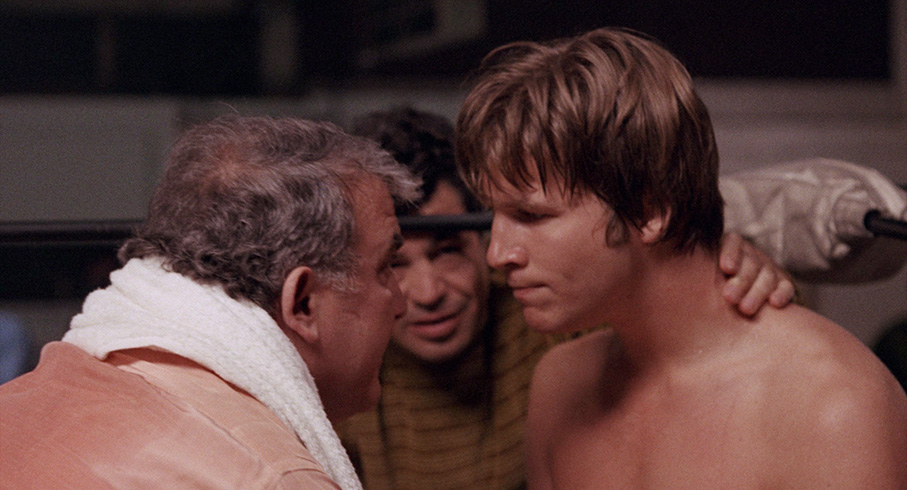
But little plays out to expectations here. Despite his training and youthful determination, Ernie loses his first fight and never does become the boxer that his early promise suggested that he would. To make ends meet, he even ends up working the fields alongside Billy in the sort of low-wage hard graft to which so many in their situation appear to gravitate. And as Ernie is forced to downgrade his dreams of a star boxing career, Billy's oft-repeated bluster that soon he will get back into shape and re-join the fight game is unexpectedly realised. He even wins what would elsewhere be the film's climactic comeback fight, a traditionally triumphant moment that is soundly undermined by the inescapable sense that this hard fought-for success has failed to provide Billy with any real sense of achievement, or fill the increasingly corrosive void in his life. And though we do root for Billy, we are also quietly encouraged to feel for his opponent, a notoriously tough Mexican boxer name Lucero (played by real-life boxer Sixto Rodriguez, no relation to the identically named subject of Searching for Sugar Man), who pees blood before the bout and then falls victim to Billy's relentless targeting of his internal injury. He departs as he arrives, completely alone, his sense of isolation hauntingly underscored by the lights that are sequentially switched off in advance of his solitary walk to the exit.
If all this makes Fat City sound like a downbeat experience, well, that's because it is, despite a sprinkling of darkly humorous moments – on the commentary track, Nick Redman even calls it one of the bleakest movies from the bleakest decade for movies. But the fact that there are no triumphant moments or crowd-pleasing twists is part of what gives this particular film its considerable impact, resonance and astonishing air of truth. We care for Billy, in spite of his self-destructive behaviour, not due to some carefully manufactured character arc in which he is made to suffer only to rise again, but because everything about him and what he goes through feels utterly and movingly authentic. Much of this is down to Stacy Keach, who inhabits the role so completely that I seriously struggled with the very idea that Huston had originally wanted to cast Marlon Brando in the part. Here Keach looks and walks and talks like a man who has lived with this way of life for years, and is every bit as true-to-life as the non-professionals in the supporting cast with whom he seamlessly interacts. He also looks every inch a down-on-his-luck and prematurely ageing working man – even the cleft lip scar he so often used to hide behind facial hair looks here more like an old boxing wound and adds to the sense that he has really taken some punishment over the years. And Keach does hopelessly drunk better than just about any other actor I can readily recall, though even he is outshone on this score by Susan Tyrell, whose extraordinary and sometimes painfully convincing portrayal of the drunken and miserable Oma landed the film its only Academy Award nomination – seriously, there are whole scenes that you can rerun endlessly just to watch her at work. This inherent realism runs through all levels of the casting, from the boxers who pepper the supporting cast to superb character actors like Nicholas Colasanto, more widely recognised as the non-too-bright Ernie 'Coach' Pantusso from Cheers but who here feels more like a real-world trainer whom Huston has recruited for his on-screen charisma. Even the young Jeff Bridges inhabits his role as Ernie so effectively that you start to forget that he is Jeff Bridges, perfectly capturing his character's sense of hopeful innocence and tellingly drifting in and out of Billy's story in a manner that intermittently suggests that he may be one day destined to follow the same path.
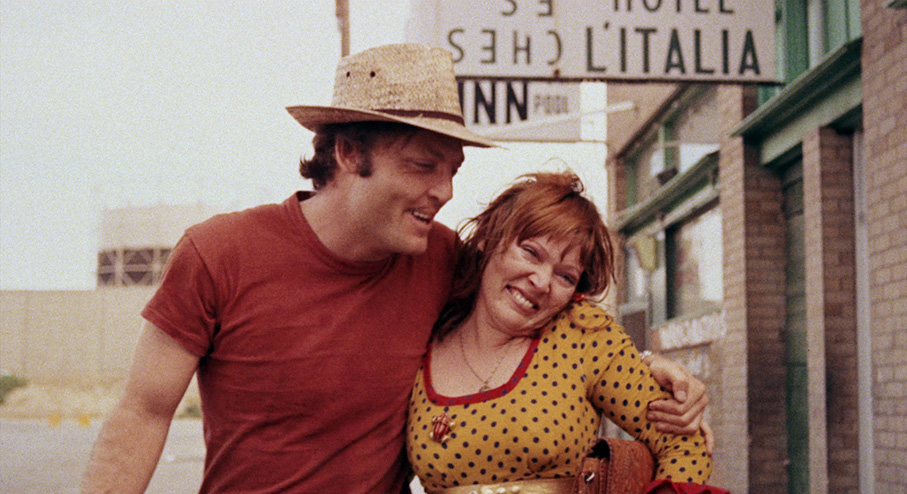
In an age of ludicrously larger-than-life superhero movies, overblown dramas and fast-cut, effects-laden action flicks, Fat City may not seem the easiest sell on the block, but it absolutely should be. Hollywood's continuing preoccupation with individuals and events that are in some way unique or extraordinary makes those few films that focus instead on individuals for whom success and fame will forever remain unrealised dreams – films about who most of us are rather than who we may aspire to be – feel even richer and more precious with the passing of time. And in a sub-genre where challenges and conflicts in and out of the ring serve as metaphors for the battles we all face in daily life, the no-punches-pulled honesty on display here is genuinely refreshing. Indeed, I'd argue that Fat City is less a boxing movie than an acutely observed story of shattered hopes and broken lives, of people for whom the American Dream is an essentially abstract concept and who can hope for little more than the strength to get by for just another few days. It even boasts a mesmerising and subtext-rich finale built around nothing more than two people drinking coffee and briefly conversing, a scene whose extraordinary (if still inexplicable) time freeze haunted me on my first viewing decades ago and remained my strongest memory of the film in subsequent years. Coming back to such a work after so long a gap was revelatory, like being re-united with and dear and long lost friend who turns out to be even more enthralling than your rose-tinted memory had convinced you that he once was. No question of it, in its touching humanity, its astonishing authenticity, its unflinching grit and its moving empathy for its broken characters, Fat City has re-established itself for me as one of the very best films from a masterful decade for American cinema, and one of the finest achievements of a director whose career was liberally peppered with greatness.
As mentioned above, Conrad Hall's cinematography here favours realism at every turn and steers clear of any hint of glamour, resulting in interiors that are lit to look as if they are not lit at all, at least in the film sense, which intermittently casts faces wholly or partially into shadow, even while their owners are delivering dialogue. And while there's something oddly beautiful about such unforced naturalism, it doesn't naturally lend itself to the sort of HD image that makes your jaw drop as soon as you hit the play button. But given that the film is designed to have a naturalistic feel and that the colour palette has been deliberately toned down (primarily through costume and set design), this is still a terrific transfer, with detail clearly visible even in gloomier scenes, except when harsher lighting is appropriate to the location (the floodlit vehicles preparing to head out to the fields in the dark of pre-dawn morning is a prime example). Although the look is gritty with a fine level of film grain, the sharpness and detail are always strong – check out the lettering on the Corn Flakes box in the background of the lamp-lit scene in which Billy prepares dinner for Oma and himself – and there's not a trace of dust or damage throughout. The transfer is framed in the original aspect ratio of 1.85:1, and was sourced from a 4K restoration by Sony, supervised by Grover Crisp and based on original photochemical work supervised by Conrad Hall.
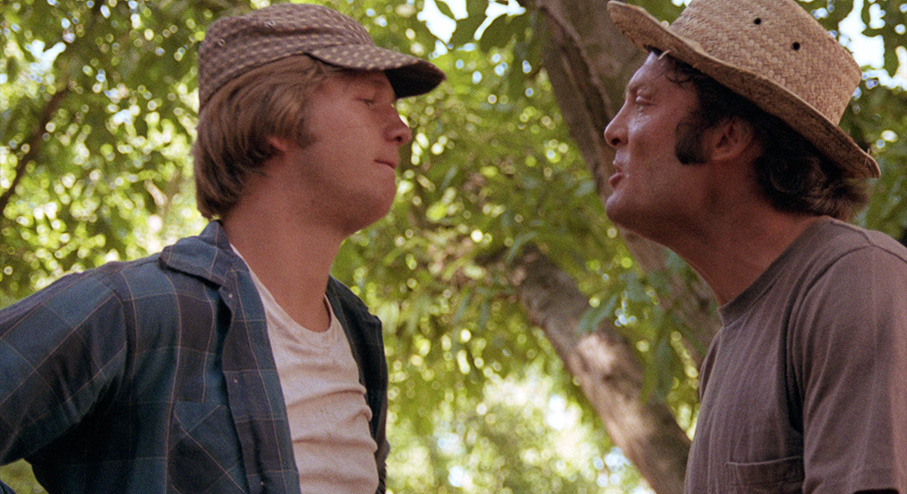
The original mono soundtrack is presented here as in Linear PCM 1.0 and is always clear with only minor restrictions in the dynamic range and no obvious instances of damage or wear. Also included is a 5.1 surround remix, which does give a little more breath to the ambient sound and greater punch to the Kristofferson's title sequence song.
Optional English subtitles for the deaf and hearing impaired are also on board, and there's a 5.1 isolated score track for those of you who like these.
Audio Commentary
Film historians and Blu-ray special feature regulars Nick Redman and Lem Dobbs takes us on a detailed journey through a movie that both clearly adore, with Dobbs even calling it the best boxing film ever and the finest movie about alcoholism he's ever seen. No argument here. There's a lot of ground covered, including discussion on the director, the source novel, the camerawork, the actors, the naturalism, the use of real-world boxers in supporting roles, the decline in popularity of boxing as a sport, and a whole load more. A barroom conversation between Billy and Oma is held up as a dramatic and filmmaking masterclass, and the film's potent sense of realism is nailed when Dobbs claims that "you can smell the resin, the sweat and the locker rooms and leather." Absolutely. After watching the film I'd make this your first port of call.
Sucker Punch Blues (54:58)
Another welcome retrospective documentary from Robert Fischer's Fiction Factory, this is built around interviews with a small handful of those who were involved in the making of Fat City, namely actors Stacy Keach and Candy Clark, casting director Fred Roos and second assistant camera Gary Vidor. Inevitably and appropriately, it kicks off with how the film first went into production, with the actors chipping in about landing and preparing for their respective roles. There's some really worthwhile contributions on Leonard Gardner's source novel, the Stockton location, Keach's preparation for the fight scenes, Conrad Hall's cinematography (which was deemed to be too dark by producer Ray Stark, who believed this would prevent the film from playing in drive-in theatres), the boxers who play supporting roles, Huston's low-key approach to direction, and plenty more. I was particularly intrigued to learn that the frozen time moment in the final scene that stayed with me for so long was not an optical freeze frame, but was achieved by Huston on an instinctive whim by simply asking everyone in the scene to remain rigidly still. It's also here that I first learned that the film was originally 20 minutes longer, and that several scenes involving Billy's post-fight fall downward spiral were shot but later removed, something that still irks Keach, though he still regards this as one of the most important films of his early career.
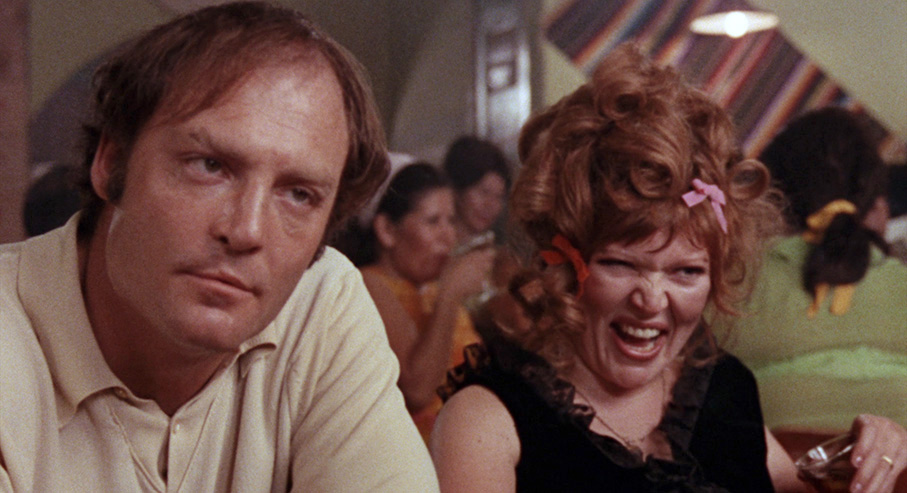
John Huston on Fat City (5:57)
Sourced from a 1972 episode of the French TV show Pour le cinema, this interview with director John Huston about the film is brief but thoroughly engaging, despite the presence of large, face-blocking French subtitles on the image and the fact that the interviewer's questions are posed in English, re-dubbed in French and then subtitled back in English for our benefit.
The John Player Lecture with John Huston (96:34)
Conducted the day after Fat City's UK premiere, this audio recording of an on-stage interview with Huston, conducted by Brian Baxter at the NFT in August 1972, has a few clarity issues but it's too valuable an inclusion for me to care. Several of the key films of Huston's career up to that point are discussed here, as is his early career as a screenwriter, though Fat City only gets a passing mention. More of the running time than expected is given over to audience questions, some of which you'll have to strain to hear, and Huston is quite candid about the films he made that he doesn't like and gives the reasons why. As you might expect from the running time, there's plenty to absorb here, and Huston himself is a most engaging raconteur. Rather than run this under a static graphic, Indicator have taken pity on us plasma screen owners and paired it with the film as a second commentary track. Thank you.
An American Classic (21:47)
Leonard Gardner, author of the novel Fat City and the screenplay for the film of the same name, talks here to Max Larkin for Radio Open Source in Boston in 2015. This is an audio extra that has been illustrated with film clips and stills for this release, which while not adding much to the experience (the stills are sometimes useful), does once again serve to protect us Plasma TV owners from screen burn. Gardner handily explains the meaning of the title and talks about the experiences of his younger days that helped inspire the characters and the story, and having read the novel again recently, he remarks that it seems a darker story than he remembers it being. He has no definitive answer to the oft-asked question about why, considering the acclaim with which this first novel was greeted, he never wrote another, and in a remark that almost feels quoted from the book, he claims that he has had to learn to come to terms with being both a failure and a success.
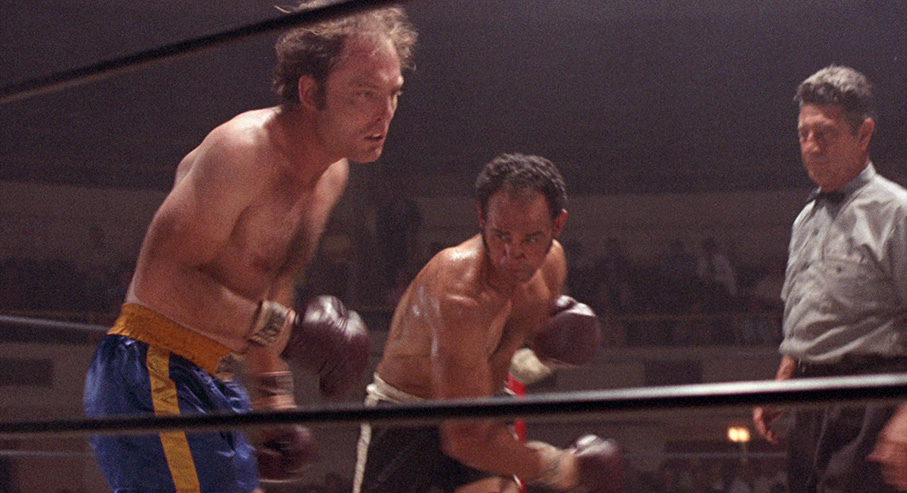
Theatrical Trailer (2:32)
Short snippets of the film intercut with a few too many shots of a neon-esque title graphic and long-held names of the principal cast and director, all set to Kris Kristofferson singing Help Me Make It Through the Night. A couple of words are bleeped, presumably at source.
Image Gallery
A small collection of promotional and behind-the-scenes stills, plus some posters.
Booklet
I love the booklets that come with Indicator releases and always set aside an hour or so – usually after I've finished the review and watched all of the on-disc features – to read and enjoy them. The one included here is well up to the usual standard, and kicks off with an excellent essay on the film by film journalist Danny Leigh, which is followed by the original Sight & Sound review by John Russell Taylor, three separately sourced quotes from John Huston on the film, and excerpts from an interview with Stacy Keach conducted at thefilmstage.com in November 2015. Credits for the film, details of the transfer and a number of high quality stills have also been included.
Fat City was widely regarded as Huston's comeback movie and it's easy to see why. It also marked the beginning of an uneven but intermittently extraordinary late-career run that included The Man Who Would Be King, Wise Blood, Under the Volcano, Prizzi's Honor and The Dead. In many ways an uncharacteristic Huston film, Fat City still stands as one of his best, and it's been given royal treatment on Indicator's exemplary dual format release. Highly recommended.
|